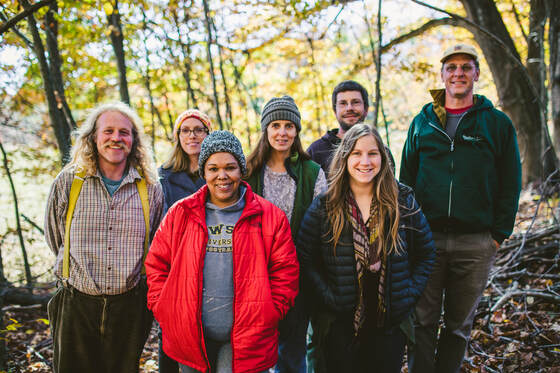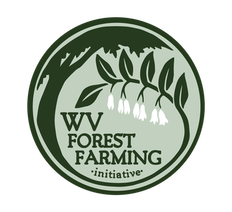Farming in the Shade
Forest Farming refers to the practice of intentionally and sustainably cultivating edible, medicinal, and other NTFPs under a forest canopy. Forest farming is an opportunity for landowners to generate income opportunities on forested property without logging. Forest farming is also a land stewardship practice that enhances the ability of the forest to perform essential environmental services such as regulating the watershed and sequestering carbon.
Non-Timber Forest Products, or NTFPs, are crops that are harvested from forests without cutting the trees. These products include edible, medicinal, and decorative plants, mushrooms, tree saps, and honey from bees that forage on trees. NTFPs are also the raw materials for a number of value added products including teas, tinctures, salves, oils, wreaths, syrups, and baskets. By cultivating these crops, West Virginians can earn premium prices for their harvests while conserving and renewing wild woodland ecosystems.
You can learn more about forest farming by visiting the Appalachian Beginning Forest Farmer Coalition.
Non-Timber Forest Products, or NTFPs, are crops that are harvested from forests without cutting the trees. These products include edible, medicinal, and decorative plants, mushrooms, tree saps, and honey from bees that forage on trees. NTFPs are also the raw materials for a number of value added products including teas, tinctures, salves, oils, wreaths, syrups, and baskets. By cultivating these crops, West Virginians can earn premium prices for their harvests while conserving and renewing wild woodland ecosystems.
You can learn more about forest farming by visiting the Appalachian Beginning Forest Farmer Coalition.
West Virginia Forest Farming Initiative Partners

The WVFFI was started through a collaborative partnership of six organizations: Appalachian Sustainable Development, Partner Community Capital (formerly the Natural Capital Investment Fund), Rural Action, Sprouting Farms, United Plant Savers, and the Yew Mountain Center.
We are members of the Appalachian Beginning Forest Farmer Coalition. Our work is supported by the Benedum Foundation, the Sacharuna Foundation, and the Beginning Farmers and Ranchers Development Program.
Read about the West Virginia Forest Farming Initiative in the Pocahontas Times.
We are members of the Appalachian Beginning Forest Farmer Coalition. Our work is supported by the Benedum Foundation, the Sacharuna Foundation, and the Beginning Farmers and Ranchers Development Program.
Read about the West Virginia Forest Farming Initiative in the Pocahontas Times.

